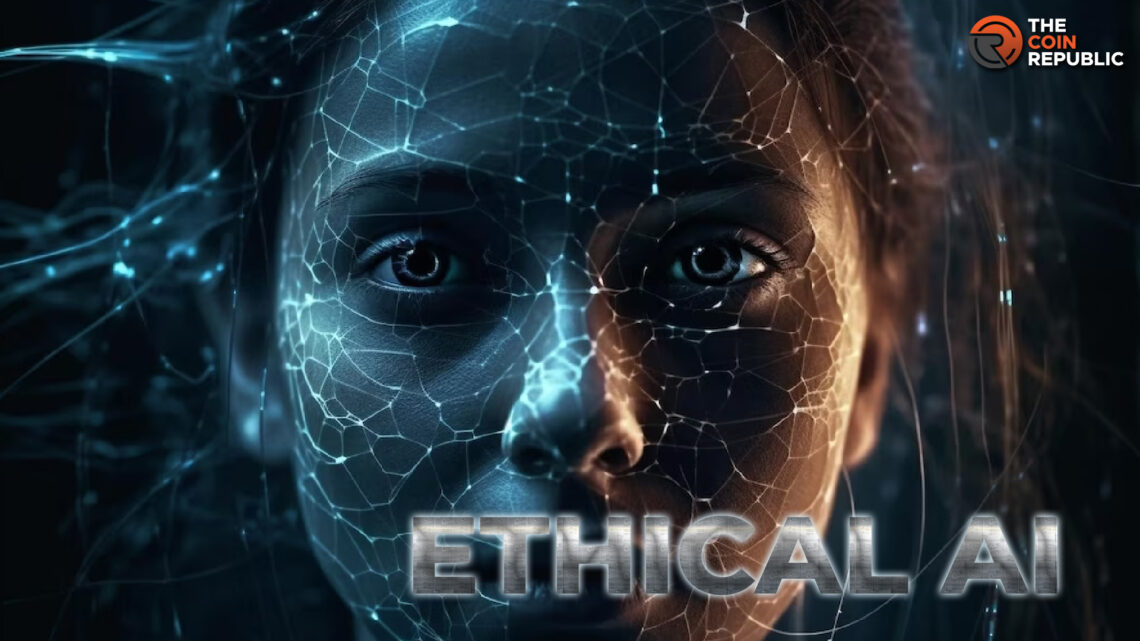- 1 Ethical AI principles encompass fairness, accountability, privacy, inclusiveness, and sustainability for responsible development.
- 2 Bias mitigation is crucial to prevent discrimination and harm in AI systems, requiring diverse approaches.
- 3 Achieving ethical AI involves overcoming challenges, fostering diversity, and advancing global cooperation and policies.
The rapid progress in artificial intelligence presents immense opportunities to improve lives but there are potential risks to keep in mind. A critical concern is the lack of transparency, accountability, and embedded biases in AI systems that could propagate discrimination and other harms. This highlights the urgent need for ethical AI – AI aligned with moral values – with concrete steps to detect and mitigate biases.
Principles of Ethical AI: Building Responsible and Beneficial AI Systems
Ethical AI refers to artificial intelligence that is designed, developed, and deployed in a socially responsible manner to prevent unethical outcomes. The core principles of ethical AI are:
Fairness – Proactively detect and eliminate unfair bias or discrimination based on race, gender, ethnicity, income, or other attributes. Use representative data and test models extensively for disparate impacts.
Accountability – Enable human control and oversight over AI systems through transparency, explainability, and strong governance. Assign responsibility for monitoring and auditing.
Privacy – Safeguard the personal data of individuals and ensure that model training uses privacy-preserving techniques like federated learning and differential privacy.
Safety and security – Comprehensively assess potential risks and harms from AI systems, like accidents, misuse, or unintended consequences.
Inclusiveness – Actively engage diverse stakeholders during development and evaluate the impact on marginalized communities. Reflect on their needs in design and testing.
Reliability – Rigorously validate the accuracy, consistency, and correctness of AI predictions, especially for high-risk applications. Establish human oversight.
Sustainability – Minimize environmental impact across the AI system’s lifecycle through energy-efficient computing and carbon-neutral cloud platforms.
Operationalizing these principles requires holistic diligence throughout the AI pipeline – from curating training data to monitoring real-world deployment impacts. It also necessitates diversity and inclusion among AI teams and leaders setting the priorities and processes. Overall, the vision for ethical AI is a technology that augments human capabilities and provides widespread benefits.
Understanding Bias in AI Systems
It is foundational to ethical AI to understand how bias permeates socio-technical systems and leads to discriminatory impacts. Bias refers to AI outputs or decisions that result in unfair prejudicial treatment of groups or individuals. Several forms of bias can arise:
Historical biases in datasets used for training get amplified through models, leading to discriminatory predictions. For example, résumé screening algorithms disadvantage female applicants.
The underrepresentation of minority populations in training data causes poor model performance when applied to those groups. For example, facial recognition fails for non-white faces.
The use of non-inclusive language and toxic text in training databases propagates harm through generative AI applications like chatbots.
Over-reliance on limited cultural contexts, like Western populations, in benchmarks and datasets while excluding underserved communities globally.
Proxy discrimination is where facially neutral attributes correlate closely with protected attributes like race or gender.
Feedback loops where an initially biased model’s predictions further skew subsequent data collection and model development.
These examples demonstrate the need to proactively assess how social, cultural and historical biases can insidiously infect AI systems and disproportionately impact marginalized communities if left unaddressed.
Approaches for Bias Mitigation
Mitigating unwanted bias requires vigilant effort across the AI development and deployment pipeline. Key techniques include:
Fostering diversity in teams and perspectives involved in framing problems, collecting data, developing models, testing, and monitoring systems post-deployment.
Thorough exploratory analysis to uncover skewed representation, label imbalance or proxy discrimination in datasets. Use techniques like re-weighting and oversampling minority groups.
Leveraging bias mitigation toolkits and frameworks like IBM’s AI FactSheets, Google’s What-If Tool, and Microsoft’s Fairlearn to detect and reduce model bias.
Extensively testing models on diverse user populations to reveal disparate performance across attributes like gender, skin tone, or cultural contexts. Incorporate human-centered evaluation metrics.
Applying in-processing techniques like adversarial debiasing and prejudice remover regularizers during model training to reduce reliance on biased features.
Enhancing transparency and explainability of models through methods like LIME and SHAP to enable audits and facilitate accountability.
Monitoring deployed models to rapidly detect emerging biases by A/B testing with shadow models and by surveying affected users.
Using techniques like federated learning to train models on decentralized data while improving privacy.
A multifaceted approach is required, spanning technical solutions and governance practices for developing unbiased and fair AI.
Challenges in Achieving Ethical AI
There are considerable challenges in achieving ethical and benevolent AI:
Arriving at comprehensive frameworks, tools, and benchmarks covering the diverse dimensions of AI ethics like transparency, justice, accountability, and dignity, remains a complex undertaking.
The lack of diversity among AI researchers and practitioners skews the field towards more privileged demographics, amplifying blind spots around potential harms.
AI’s black-box nature, reliance on abundant data, and adaptive complexity limit transparent audits for accountability, especially as systems grow more advanced.
Balancing innovation, speed-to-market, and thorough ethical impact assessments poses trade-offs for businesses and developers.
Differences in cultural values and regional regulations complicate global coordination and alignment around AI governance.
In the long-term, highly advanced AI systems lacking human-aligned goals could potentially lead to catastrophic harms.
Overcoming these multifaceted obstacles will require sustained, long-term efforts in research, education, policymaking, and grassroots advocacy. The benefits of ethical AI warrant proper investments and diligence.
Advancing Ethical AI
Several steps can help drive progress towards benevolent, ethical AI:
Formulating policy frameworks that encode key ethical principles into legal requirements for AI systems. Global accords like the EU’s AI Act provide initial templates.
Investing in open repositories of high-quality, unbiased datasets and models to enable better algorithm development and testing for fairness.
Launching large-scale education initiatives to develop AI literacy across businesses and the public, driving grassroots adoption of ethical practices.
Introducing incentives and accountability mechanisms like external audits, impact assessments, and ethics boards for organizations to prioritize ethical AI.
Assembling interdisciplinary teams encompassing social scientists, humanists, domain experts, and engineers to holistically assess AI systems from multiple perspectives.
Technology leaders establish and champion the adoption of responsible AI guidelines and best practices to catalyze ecosystem-wide change.
The vision should be AI designed to enhance human dignity, justice, and welfare for all. With sustained coordination, ethical AI promises to be a positive, transformative force uplifting society. However, achieving its full potential requires ceaseless diligence from all actors to ensure that its impacts are guided by our deepest-held values.
Conclusion
The path towards benevolent AI that promotes prosperity for all is challenging but necessary. With thoughtful coordination across stakeholders, ethical AI promises to be a positive transformative force uplifting society. However, achieving its full potential requires ceaseless diligence from all actors.
Researchers, businesses, policymakers, and the public must work together to create AI systems guided by moral values of justice, accountability, and human welfare. We have the responsibility to shape AI as a technology that enhances human dignity while avoiding unintended harms. By imbuing the principles of ethical AI throughout the development process, we can steer these powerful technologies towards equitably serving humanity.

Nancy J. Allen is a crypto enthusiast, with a major in macroeconomics and minor in business statistics. She believes that cryptocurrencies inspire people to be their own banks, and step aside from traditional monetary exchange systems. She is also intrigued by blockchain technology and its functioning. She frequently researches, and posts content on the top altcoins, their theoretical working principles and technical price predictions.


 Home
Home News
News






